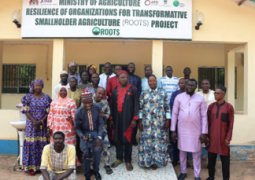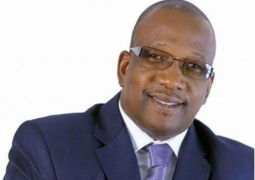Despite his odds due to lack of education or skills coupled with being born in a poor rural household, Janneh Keita never fancied the idea of backway. Not even when his own uterine brother, Karamo Keita, took the risky journey. Janneh’s abhorrence to the backway even grew stronger when his brother returned, after his unsuccessful bid to Europe. He was voluntarily returned with a host of other young Gambians who were stranded in Libya.
The backway returnees decided to form an association called Youth Against Irregular Migration (YAIM) in 2017. Karamo was made the chairperson of the association.
The association began to grow bigger as more and more stranded Gambians in Libya enroute to Europe aborted their journey and decided to voluntarily return to The Gambia. They joined YAIM in the campaign against irregular migration by sharing their real life experiences of the horrendous journey.
Given Janneh’s obsessive dislike of the backway, he was included in YAIM’s nationwide campaign against irregular migration in 2020. It was part of the association’s project funded by the German government through the German Embassy.
But Janneh’s dislike for the backway and the horrific stories of his brother and others could not dissuade him from the embarking on the journey himself. He eventually took the risk.
Mansa Banko Online has learnt that Janneh Keita left The Gambia in February, 2022 through Dakar to Mali headed for Libya and Europe. He left together with his two age-mates of the same village.
According to someone who claimed to be close to Janneh, the 28-year-old had been saying: “I am left with no option but only to travel to the back-way because I am married and my brother is married. And we are both living in the same family compound. In the near future, our wives could have problem and my brother might ask me to leave the compound and I will not have any option but to leave because he built the house and fenced the compound so he might claim that everything belongs to him.”
The person begs for anonymity.
But Janneh was not the lone crusader that threw in the towel.
Rohey M. Bah, 30, resident of Brikama in the West Coast Region (WCR), was also a no-to-backway campaigner. But in October, 2020 she also took the irregular route with the hope of going to Spain. The journey was, however, futile.
Ms. Bah eventually returned to The Gambia on 2nd December, 2021 with the support of IOM from Mauritania.
“My reasons of taking the back-way was that I have taken the Mini Loan from Social Development Fund (SDF) and I was unable to pay it back due to failure in my fishing boat project and lack of financial support in my business,” she said.
Irregular migration crusades
The Youth Empowerment Project (YEP), is a flagship project of the European Union Emergency Trust Fund for Africa (EUTF). The programme action “Tekki-Fii” (a Wollof word meaning ‘Make it in The Gambia’) seeks to contribute to socioeconomic development and nurturing of positive prospects for the Gambian youth, including returnees and/or potential migrants by promoting attractive employment and income opportunities.
YEP focuses on vocational training and support for micro and small-sized enterprises and creating new jobs through value addition and market linkages.
Over the years, YEP and YAIM have had lots of project partnerships. YAIM has participated in the consultation meeting to evaluate the European Union Trust Fund (EUTF)-IOM Reintegration Project from 2017 to 2021.
The association also led the first Multi-Stakeholder Roundtable Discussion on Irregular Migration and Transitional Justice Conference funded by International Coalition of Sites of Conscience (ICSC). It also organised a weeklong Community Reflection Session with opinion leaders, local authorities, migrant returnees, and ward development committee. The session was centered on migrant reintegration and funded by the National Youth Council (NYC).
TekkiFii Grants and Loan amounts
Through TekkiFii projects and collaboration, YEP works with the government, business community, youth groups and development partners to show young people – especially those most vulnerable to migration – that they can survive and thrive in The Gambia.
The project offers solar grant of up to two hundred and fifty thousand dalasis (D250,000.00) and is supported by GIZ International Services (in German- GesellschaftfürInternationaleZussammenarbeit (GIZ).
The agribusiness grant also caters for applications for up to two hundred and fifty thousand dalasis (250,000.00) and is offered by the InstitutoMarquês de Valle Flôr (IMVF).
The TekkiFii Mini Grant provides support of up to fifty thousand dalasis (50,000.00) in all sectors and across the country. It is supported by ITC/YEP.
The grants facilitate acquisition of equipment, materials, licenses and other business-critical inputs and assets. The grants are disbursed either as cash or kind, but kind disbursements are given priority, where feasible. No collateral, interest rate or repayment is required in these grants. And grantees receive financial literacy training to improve their capacity to save, exercise financial planning and separate their private funds from the funds of the business.
In the implementation of the grants, the National Association of Credit Unions of The Gambia (NACCUG), through Memorandum of Understanding (MoU) was responsible for the coordination and management of the grants.
In 2018, in bringing a solution to increased accessibility to finance for youth-led micro, small and medium sized enterprises in The Gambia, YEP in partnership with the Social Development Fund (SDF) launched the Mini Loan Scheme. Two main loan facilities it has are: Working Capital Loans (WCL) and Loans for the Acquisition of Required Machinery, Equipment and Premises.
The average loan amount per beneficiary is GMD 150,000. The amount of financing to a single beneficiary is dependent on the application assessment and business plan proposed but is not more than GMD 480,000.The loan term is a maximum period of 12 months and a minimum period of 6 months per loan cycle with an annual interest rate of 10 percent.
For Working Capital Loans applicants will be required to provide a collateral value of 75% of the total loan requested while loans disbursed for the acquisition of machinery, equipment, new premises, improvement and expansion of existing premises require a joint registration of the items in the names of both the borrower and the SDF as a security until the loan is fully liquidated by the borrower.
But the loans sometimes before the problem, if the business project did not go as envisaged.
This was Bah’s experience as she narrated her reason for going: “I decided to leave The Gambia for greener pasture because all my investments in the fishing boat which was a loan has failed and I was not getting support to Make it in The Gambia to sustain my business, so the only option I have is to leave the country because of my integrity is at stake.”




